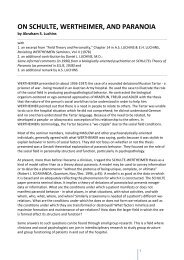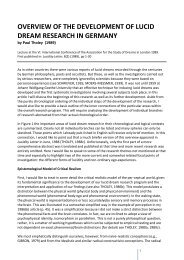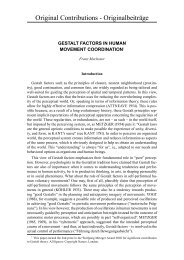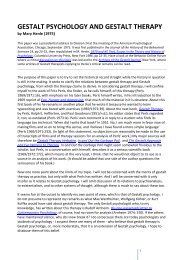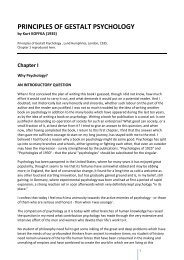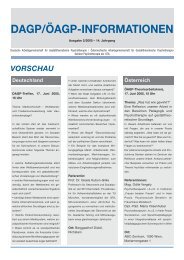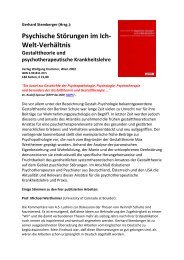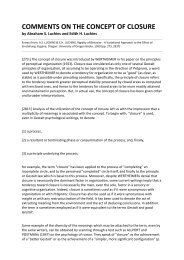pdf-Download - Society for Gestalt Theory and its Applications (GTA)
pdf-Download - Society for Gestalt Theory and its Applications (GTA)
pdf-Download - Society for Gestalt Theory and its Applications (GTA)
Create successful ePaper yourself
Turn your PDF publications into a flip-book with our unique Google optimized e-Paper software.
epistemological weaknesses as FREUD by straining the concept of unconscious projections. For<br />
him every part of the dream - people, animals, plants etc. - is a projection of alienated aspects of<br />
the personality. I think it's a shame that one of the most important aspects of <strong>Gestalt</strong> therapeutic<br />
work - i.e. dream work - is burdened with a discrepant theoretical foundation.<br />
"For the critical realist there is absolutely no reason to consider all parts of a dream to be<br />
projections, just as there is no reason to view the waking perceptions of psychical processes within<br />
the phenomenal environment - e.g. another person's mood - as such projections. Such a view is<br />
the result of what we have mentioned be<strong>for</strong>e, which is blending the objective appearing world of<br />
perception (which belongs to the phenomenal world of a person) with the physical world."<br />
"Yes," Theo adds, "so whether we're dealing with the perception of a figural fact, like a rectangle,<br />
or the perception of the physical existence of a person on the one h<strong>and</strong>, or with the perception of<br />
a so-called psychical fact, like a solemn or a happy tune or the sadness of another person, on the<br />
other h<strong>and</strong>, neither example is a case of objective facts in terms of the physical world. Both cases<br />
are psychical facts, i.e. processes within the psychical world of a person. Hence the accusation that<br />
<strong>Gestalt</strong> theory has examined perception, but hardly any psychical processes, reveals gross<br />
ignorance.<br />
"Perception of any kind is a psychical process. There<strong>for</strong>e, the stock of knowledge <strong>Gestalt</strong> theory<br />
has enabled about figural perception as well as thinking or emotions is of immediate importance<br />
to our underst<strong>and</strong>ing of psychical processes. We don't need analogous conclusions, like it has<br />
been suggested; although we have to own that the same basic principles, the so-called <strong>Gestalt</strong><br />
laws, will produce different results according to the circumstances <strong>and</strong> the material."<br />
"That's a truism, though, isn't it!" Friedrich interrupts sharply. "Of course the consequences will<br />
differ according to whether it's two people or two matches which get together under the law of<br />
proximity. Who needs to have that explained?! Oh, I just remembered who does." Fritz smiles:<br />
"And on top of that everyone who wants to be or become a <strong>Gestalt</strong> theoretical psychotherapist<br />
ought to know this by heart <strong>and</strong> be able to quote it any time."<br />
"Anyway," Friedrich continues, "in case I haven't made myself clear: PERLS makes use of this<br />
circumstance in the exercises he suggests to his clients in order to enhance their awareness.<br />
Suddenly he's right again in what he practices."<br />
"I'd like Paul to be able to finish his thoughts about dreams," I urge. "It's really very simple," Paul<br />
says. "According to critical realism the external position of dreams, i.e. the fact that people <strong>and</strong><br />
things appear outside of us in dreams just like they do when we're awake, doesn't need an<br />
explanation. Dreams deal with the same phenomenal world as our waking existence, except that<br />
assimilating new in<strong>for</strong>mation is restricted to the phenomenal body-ego. But a lot of what appears<br />
in our dreams we have seen previously. There<strong>for</strong>e it's unnecessary <strong>for</strong> us to project these<br />
appearances. This isn't to say, of course, that we don't still do 'project' (even though that is an<br />
epistemologically doubtful Freudian term) things <strong>for</strong> our own enjoyment or because of masochist<br />
tendencies as regards the characters of people in our dreams, <strong>for</strong> instance, or as to what they like<br />
or don't like, do <strong>for</strong> us or against us."<br />
"Yes," agrees Theo. "And this is where the epistemological weakness of <strong>Gestalt</strong> therapy like that of<br />
psychoanalysis can turn into disregarding every utterance of the patient as being a projection,<br />
which is what Alice MILLER (1981) complains about so vehemently." Fritz nods: "I'll admit that<br />
9



